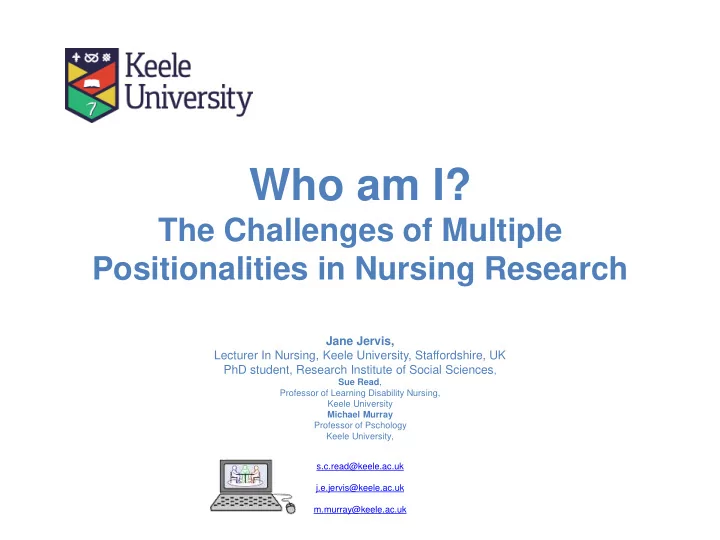

Who am I? The Challenges of Multiple Positionalities in Nursing Research Jane Jervis, Lecturer In Nursing, Keele University, Staffordshire, UK PhD student, Research Institute of Social Sciences , Sue Read , Professor of Learning Disability Nursing, Keele University Michael Murray Professor of Pschology Keele University, s.c.read@keele.ac.uk j.e.jervis@keele.ac.uk m.murray@keele.ac.uk
Where am I from… Staffordshire is in the Midlands area of England. It is 4265 miles from Banff.
Aims are to… • Introduce the background and rationale for my PhD research • Discuss the multiple identities and positionalities encountered and the associated challenges
Background and rationale Advanced Nurse Practitioner at a large teaching hospital ….. • a lead member of the cardiac arrest team • performing initial clinical assessments • planning the management of adult medical patients. Ensuring quality care through education and support of nursing and medical staff Ensuring appropriate policy/procedures are in place
My Journey…Adult Nurse Researching Children? MSc – Children: Critical Perspectives Experience in MAU & Cardiac Arrest Team ‘Sudden Death’ Chapters PhD PAR study to improve support provided to children and their families when visiting relatives in hospital
Research objective A Participatory Action Research (PAR) study to improve the support provided to children and their families when visiting adult relatives in hospital.
Why PAR? • Researcher as change agent is a pivotal role in both developing and maintaining the research • Where knowledge is irrevocably linked with action and produces outcomes relevant to that particular practice (McLeod, 2001) • An approach that emphasises collaboration, participation, active engagement and inclusion • Where the researcher’s relationship with the practice area of adult nursing remains a crucial element of the research and its subsequent development (Read, 2013)
Continuum of Positionality Herr and Anderson ( 2015) Insider Insider/Insider Insider/Outsider Studies own practice Collaborative Collaborative Practitioner research Feminist consciousness Inquiry groups Self study Inquiry teams Critique/improve practice Critique own practice Professional organisational Professional organisational Self professional transformation transformation transformation Reciprocal Outsider/Insider Outsider/Insider Insider-Outsider teams Collaborative Traditional Participatory – equitable Organisational Knowledge base power relations transformation Research on action Critique/improve practice Mainstream change research methods or Professional organisational agencies projects. transformation Community empowerment
Expected positionality - Cycle 1 Researcher (Insider) Insider collaborating with Insiders - Reciprocal Participants
Positionality – Cycle 2 Insider collaborating with other insiders Outsider Researcher Insider collaborating with Insiders Outsider collaborating with other outsiders (OR insider collaborating with outsiders)
Nurses derive their self-concept and professional identity from their public image, work environment, work values, education and traditional social and cultural values TEN HOEVE Y., JANSEN G. & ROODBOL P. (2014)
Personal, professional positionalities Colleague Senior nurse Insider Nurse practitioner Gender Outsider Godparent Academic Family status Researcher Friend PhD student Social status Geographical location
Participant personal, professional positionalities Nurse in Adult nurse Ward Nurse Colleague charge Children's Nurse Gender Parent Child Family status Patient Relative Friend Social status Geographical location Co-researcher
Illustrated by Laura Green
Summary In nurse research… • The researchers positionality to the participants and the setting is central to the research process • Positionality – Is fluid and complex – Links to ethics and trustworthiness of the research – Links to both researcher and participant professional personal identities, values and assumptions
References Herr, K. and Anderson, G.L. (2015) The Action Research Dissertation . Second Edition. London, Sage McLeod, J. (2001). Qualitative research in counselling and psychotherapy . London: Sage. Read, S (2013) Facilitating bereavement support for people with intellectual disabilities in England IN J. Hockley, K. Froggatt, & K. Heimal (Eds) Participatory research in palliative care . Oxford: Oxford University Press.
Thank you for Listening. Any questions ? Jane Jervis Lecturer in Nursing PhD Student School of Nursing & Midwifery, Keele University, Staffordshire, UK. j.e.jervis@keele.ac.uk
Recommend
More recommend